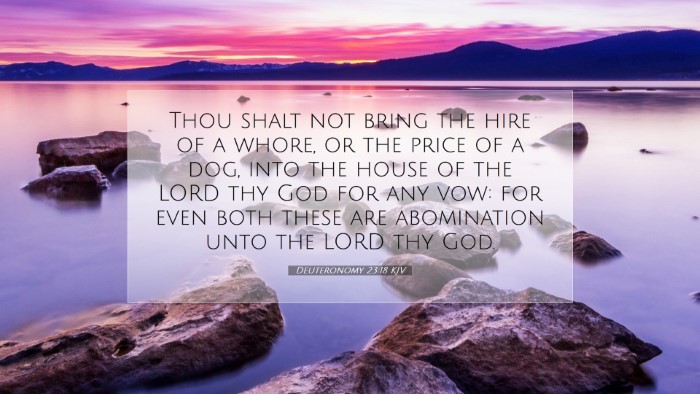Commentary on Deuteronomy 23:18
Bible Verse: "You shall not bring the hire of a harlot or the price of a dog into the house of the Lord your God for any vow, for both of these are an abomination to the Lord your God." (Deuteronomy 23:18)
Introduction
Deuteronomy 23:18 presents a clear command regarding the offerings brought to God, highlighting the holiness required in worship. This verse, in its historical context, provides insight into Israelite worship and their understanding of purity and righteousness before God. The interpretations and reflections from historical commentaries serve vast audiences—pastors, students, theologians, and scholars—seeking deeper understanding.
Contextual Analysis
This verse is situated within a larger discourse of laws intended to maintain the sanctity of worship among the Israelites. The juxtaposition of the 'hire of a harlot' and 'the price of a dog' suggests significant moral and ceremonial implications. The term 'hire of a harlot' is understood as earnings from immoral acts, emphasizing the clear disapproval of illegitimate sources of income in holy transactions.
The 'price of a dog' is commonly interpreted as a reference to a male prostitute or perhaps, more generally, to anything considered unclean. Both of these forms of income are deemed unsuitable for offerings before God, indicative of a broader principle regarding the sources of one’s gifts to God.
Insights from Matthew Henry
Matthew Henry, in his commentary, emphasizes the concept of holiness and purity in worship. He articulates that God demands integrity not only in the acts of worship but also in the means through which one approaches Him. Henry asserts that the Israelites are reminded that their offerings should stem from morally and spiritually acceptable sources—indicating the underlying principles of purity that govern the relationship with God.
He also explores the broader implications of the ‘hire of a harlot’, linking it to idolatry—suggesting that such offerings could corrupt the spiritual integrity of the worshiper. The ‘price of a dog’ could be seen as a symbol of uncleanliness and idolatrous practices, which are an abomination to God.
Insights from Albert Barnes
Albert Barnes provides a more linguistically inclined examination, pointing out the potential origins and uses of terms within the verse. He stresses the notion that these abominable earnings should never be sanctified for religious purposes. Barnes aligns the implications of this command with the overarching theme of ritual purity. The earnings from such sources are not merely unfit but are spiritually toxic.
Barnes especially highlights the gravity of misrepresenting one's intentions before God through impure offerings. He posits that the verse signifies an essential distinction between that which is consecrated to God and that which is derived from sin and morality failures. It challenges the believer to introspect the motives and sources of their worship.
Insights from Adam Clarke
Adam Clarke provides a comprehensive theological perspective, interpreting the text in the light of God’s holiness and justice. He argues that the prohibition reflects a desire for pure worship practices among God’s people. Clarke emphasizes that God rejects offerings that come from sinful endeavors; thus, the very essence of worship is rooted in morally sound choices.
He delves into the cultural significance of these prohibitions, explaining the relationship between economic practices and spiritual integrity. Clarke’s exploration posits that the spiritual economy of God requires sincere devotion, and such abominable offerings lead to societal decay, undermining spiritual values.
Theological Implications
-
Integrity in Offerings: This verse demands believers evaluate the sources of their offerings. Integrity and purity are foundational to worship.
-
Application of Moral Law: As modern-day believers, there’s an intrinsic call to consider the moral implications of our contributions to God’s ministry.
-
Worship and Righteousness: Worship that does not spring from a place of righteousness and integrity is rejected by God, thereby establishing a standard for believers today.
Conclusion
Deuteronomy 23:18 offers profound lessons on the sanctity of worship. The insights provided by renowned commentators—Matt Henry, Albert Barnes, and Adam Clarke—invite rigorous theological reflection. The call to assess the motivations and sources of our offerings is crucial in a world where moral ambiguity often pervades religious practices. This command resonates with the essentiality of purity, integrity, and holiness, reminding believers that God looks beyond the surface and into the heart of worship.


